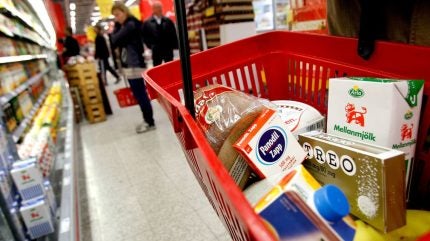
Sweden will halve its VAT on food products as part of its 2026 budget as it looks to reduce the burden of inflation on Swedish families.
A statement from the country’s Ministry of Finance today (4 September) confirmed the government plans to temporarily cut VAT on food from 12% to 6%.

Discover B2B Marketing That Performs
Combine business intelligence and editorial excellence to reach engaged professionals across 36 leading media platforms.
The move is expected to come into force from 1 April next year, running until 31 December 2027.
“This means that all Swedes are expected to receive cheaper grocery bags, and those who earn the least will be affected the most in percentage terms,” the statement said.
A grocery bag for a family with two children is anticipated to become Skr6,500 ($686.60) cheaper, according to presentation slides on the budget plans from the ministry.
Food prices in Sweden have been driven by previously high inflation, lack of competition in the grocery sector and environmental issues such as drought and energy prices, it said.

US Tariffs are shifting - will you react or anticipate?
Don’t let policy changes catch you off guard. Stay proactive with real-time data and expert analysis.
By GlobalDataThe government will expect grocery stores to lower food prices. The ministry said “a food price commission” will be set up, through which the government’s Swedish Consumer Agency and other authorities will monitor prices.
The government will also ask the Swedish Agency for Economic and Regional Growth to find “possible simplification measures” in the grocery sector. It is also calling on the local competition watchdog to “guide municipalities in promoting competition”, to set up more grocery stores.
“This is a reform that has the greatest impact for the households that have had it the toughest,” Deputy Prime Minister Ebba Busch said in a post on X.
In July, Sweden’s inflation rate reached 3% in terms of Consumer Price Index with a Fixed interest rate (CPIF), up slightly on 2.8% in June. It was up 0.8% in July in terms of Consumer Price Index (CPI) measures.
Statistics Sweden’s flash estimate has forecast 3.3% CPIF inflation for the country in August.
Inflation hit a peak in Sweden towards the end of 2022, when it reached 12.3% in CPI and 10.2% in terms of CPIF measures.
Commenting on the government’s latest move, the Swedish Food Federation (Livsmedelsföretagen) said: “Food production in Sweden is decreasing in a situation where we need to increase production, not least for reasons of preparedness. We therefore welcome all measures that can strengthen the purchasing power of Swedes, including halving food VAT.
“On the margin, reduced food VAT benefits Swedish production as the price gap against low-priced imports decreases in kronor and cents. A reduction in food VAT means reduced food prices for Swedish households, but it will not prevent continued increases in production costs. Food prices will continue to increase in the future, but from lower levels.”



